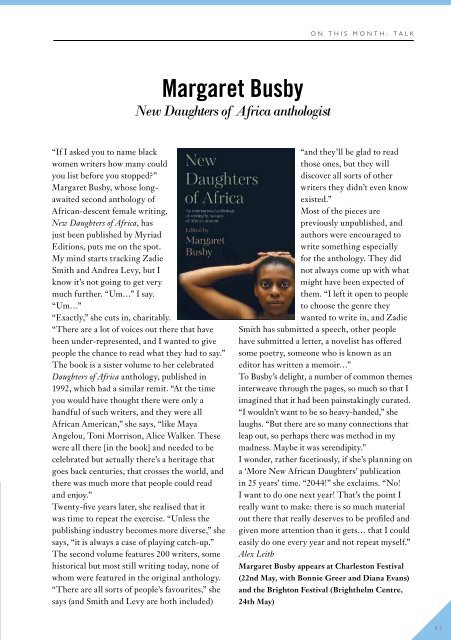You also want an ePaper? Increase the reach of your titles
YUMPU automatically turns print PDFs into web optimized ePapers that Google loves.
ON THIS MONTH: TALK<br />
Margaret Busby<br />
New Daughters of Africa anthologist<br />
“If I asked you to name black<br />
women writers how many could<br />
you list before you stopped?”<br />
Margaret Busby, whose longawaited<br />
second anthology of<br />
African-descent female writing,<br />
New Daughters of Africa, has<br />
just been published by Myriad<br />
Editions, puts me on the spot.<br />
My mind starts tracking Zadie<br />
Smith and Andrea Levy, but I<br />
know it’s not going to get very<br />
much further. “Um…” I say.<br />
“Um…”<br />
“Exactly,” she cuts in, charitably.<br />
“There are a lot of voices out there that have<br />
been under-represented, and I wanted to give<br />
people the chance to read what they had to say.”<br />
The book is a sister volume to her celebrated<br />
Daughters of Africa anthology, published in<br />
1992, which had a similar remit. “At the time<br />
you would have thought there were only a<br />
handful of such writers, and they were all<br />
African American,” she says, “like <strong>May</strong>a<br />
Angelou, Toni Morrison, Alice Walker. These<br />
were all there [in the book] and needed to be<br />
celebrated but actually there’s a heritage that<br />
goes back centuries, that crosses the world, and<br />
there was much more that people could read<br />
and enjoy.”<br />
Twenty-five years later, she realised that it<br />
was time to repeat the exercise. “Unless the<br />
publishing industry becomes more diverse,” she<br />
says, “it is always a case of playing catch-up.”<br />
The second volume features 200 writers, some<br />
historical but most still writing today, none of<br />
whom were featured in the original anthology.<br />
“There are all sorts of people’s favourites,” she<br />
says (and Smith and Levy are both included)<br />
“and they’ll be glad to read<br />
those ones, but they will<br />
discover all sorts of other<br />
writers they didn’t even know<br />
existed.”<br />
Most of the pieces are<br />
previously unpublished, and<br />
authors were encouraged to<br />
write something especially<br />
for the anthology. They did<br />
not always come up with what<br />
might have been expected of<br />
them. “I left it open to people<br />
to choose the genre they<br />
wanted to write in, and Zadie<br />
Smith has submitted a speech, other people<br />
have submitted a letter, a novelist has offered<br />
some poetry, someone who is known as an<br />
editor has written a memoir…”<br />
To Busby’s delight, a number of common themes<br />
interweave through the pages, so much so that I<br />
imagined that it had been painstakingly curated.<br />
“I wouldn’t want to be so heavy-handed,” she<br />
laughs. “But there are so many connections that<br />
leap out, so perhaps there was method in my<br />
madness. <strong>May</strong>be it was serendipity.”<br />
I wonder, rather facetiously, if she’s planning on<br />
a ‘More New African Daughters’ publication<br />
in 25 years’ time. “2044!” she exclaims. “No!<br />
I want to do one next year! That’s the point I<br />
really want to make: there is so much material<br />
out there that really deserves to be profiled and<br />
given more attention than it gets… that I could<br />
easily do one every year and not repeat myself.”<br />
Alex Leith<br />
Margaret Busby appears at Charleston Festival<br />
(22nd <strong>May</strong>, with Bonnie Greer and Diana Evans)<br />
and the Brighton Festival (Brighthelm Centre,<br />
24th <strong>May</strong>)<br />
43


















